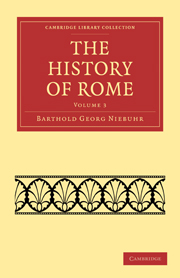Book contents
- Frontmatter
- PREFACE
- Contents
- The Licinian Rogations
- The new curule Dignities of the year 384
- Internal History down to the complete establishment of the plebeian Consulship
- On the Uncial Rate of Interest
- History of the Wars from 384 to 406
- Rome in Alliance with Latium
- The earliest Constitution of the manipular Legion
- The first Samnite War
- The Latin War
- The Laws of the Dictator Q. Publilius
- Internal History down to the Caudine Peace
- Alexander of Epirus
- Forein Relations down to the second Samnite War
- The second Samnite War
- Relations between Rome and the Nations bordering on Samnium after the Peace
- The Etruscan Wars down to the beginning of the third Samnite War
- Internal History from the Caudine Peace down to the third Samnite War
- Cn. Flavius
- The Censorship of Q. Fabius and P. Decius
- The Ogulnian Law
- Various Occurrences of the same Period
- The third Samnite War and the Others of the same Period
- Internal History from the Beginning of the second Samnite War down to the Lucanian
- Miscellaneous Occurrences of the same Period
- The Etruscan and Gallic War
- The Lucanian, Bruttian, fourth Samnite, and Tarentine Wars
- Epirus and Pyrrhus
- The Roman and Macedonian Tactics
- The War with Pyrrhus
- Entire Subjugation of Italy, and the Political Rights of the Italian Allies
- Internal History and Miscellaneous Occurrences of the Period from the Lucanian down to the first Punic War
- The first Punic War
- Index
- ERRATA
Various Occurrences of the same Period
Published online by Cambridge University Press: 01 June 2011
- Frontmatter
- PREFACE
- Contents
- The Licinian Rogations
- The new curule Dignities of the year 384
- Internal History down to the complete establishment of the plebeian Consulship
- On the Uncial Rate of Interest
- History of the Wars from 384 to 406
- Rome in Alliance with Latium
- The earliest Constitution of the manipular Legion
- The first Samnite War
- The Latin War
- The Laws of the Dictator Q. Publilius
- Internal History down to the Caudine Peace
- Alexander of Epirus
- Forein Relations down to the second Samnite War
- The second Samnite War
- Relations between Rome and the Nations bordering on Samnium after the Peace
- The Etruscan Wars down to the beginning of the third Samnite War
- Internal History from the Caudine Peace down to the third Samnite War
- Cn. Flavius
- The Censorship of Q. Fabius and P. Decius
- The Ogulnian Law
- Various Occurrences of the same Period
- The third Samnite War and the Others of the same Period
- Internal History from the Beginning of the second Samnite War down to the Lucanian
- Miscellaneous Occurrences of the same Period
- The Etruscan and Gallic War
- The Lucanian, Bruttian, fourth Samnite, and Tarentine Wars
- Epirus and Pyrrhus
- The Roman and Macedonian Tactics
- The War with Pyrrhus
- Entire Subjugation of Italy, and the Political Rights of the Italian Allies
- Internal History and Miscellaneous Occurrences of the Period from the Lucanian down to the first Punic War
- The first Punic War
- Index
- ERRATA
Summary
As if it were an hereditary obligation to protect the freedom of the citizen, the consul M. Valerius renewed in more careful terms in the year 446 (452) the law of his ancestor, which secured an appeal to the people in cases where the highest magistrates had sentenced a person to corporal punishment, but still without affixing a definite punishment for the offender. The different degrees of the crime and of the excuses that might be made for it, were of too various a kind, not to leave it entirely to the discretion of the tribunes in those times, which feared to endanger the power of those who were called to the government, whether they should bring forward an accusation for a heavier or a lighter punishment when the time came, in case they should not be able, which can seldom have happened, to prevent the outrage.
I assign to about this period the Lex Furia respecting wills, which is evidently very much older than the Voconian law, and the author of which may probably be supposed to be the same L. Furius, who wrote laws for the conventus at Capua in 430 (436). This law, which, as is well known, forbade with a few exceptions, of which the particulars are not stated, any single person to bequeath by will more than a thousand ases, and which condemned him who received more in violation of the law, to a fourfold punishment like a usurer, is of importance on acocunt of the causes which gave rise to it.
- Type
- Chapter
- Information
- The History of Rome , pp. 354 - 356Publisher: Cambridge University PressPrint publication year: 2010First published in: 1842

